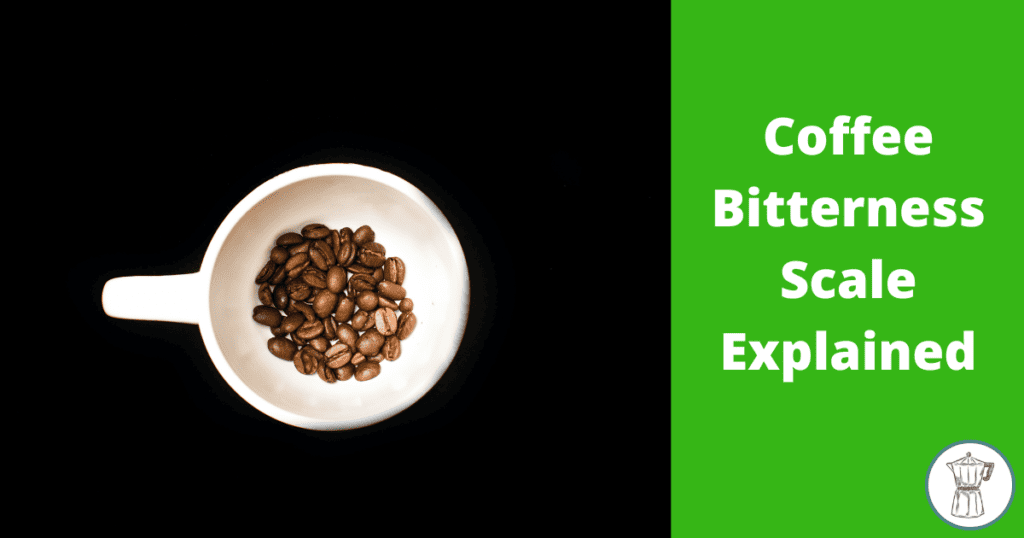Ever wonder about the coffee bitterness scale and what are the factors affecting the bitterness level in coffee?
Stick around, in this article I’m going through the factors that make coffee bitter and I also share brewing tips and tricks along the way.
Let’s dive in.
4 Factors that affect the bitterness level
Let’s chat about the main factors that affect the level of bitterness in coffee beans.
1. Roast type
Typically, the longer the beans are roasted the more bitter the coffee they’re going to produce. There are 3 widely known coffee roast types:
- Light (Blonde)
- Medium
- Dark
Light roast coffee beans are roasted for about 10 minutes at 350°F-400°F (177°C–204°C) degrees and their taste is fruity and tangy, medium roast coffee beans are roasted for 10-15 minutes at 410°F-428°F (210°C and 220°C), while dark roast coffee beans are roasted for 15-30 minutes at 356°F-482°F (180°C and 250 °C).
Why dark roast coffee is more bitter than the other 2 roasts?
It’s because chlorogenic acids break down during the roasting process…
Let me explain:
During roasting, chlorogenic acids break into phenylindanes and lactones. The longer the roasting lasts the more chlorogenic acids break into phenylindanes which turn coffee bitter. Coffee made with dark roast coffee beans typically tastes nutty or chocolate (it depends on the region the beans grow).
2. Coffee type
The most popular coffee types are Robusta and Arabica.
As you might have guessed 1 type of the two produces more bitter coffee than the other.
More specifically, the taste of coffee made with Robusta coffee beans is more bitter than the one brewed with Arabica beans. It takes longer for Robusta coffee beans to grow, meaning that each coffee bean contains more caffeine than Arabica (Robusta has 2.7% caffeine content vs. Arabica has 1.5%). And because the caffeine level affects the bitterness in coffee, Robusta produces more bitter coffee than Arabica.
Brazil is the number 1 Arabica coffee bean producer while most of Robusta coffee beans grow in VIetnam.
3. Brewing method
Let’d face it, brewing coffee is more of a science than an art really.
As long as you stick to the best practices of the gadget/machine you use for brewing you’ll be good. For example, if you brew with a Moka pot you should use fine grinds, otherwise your coffee will get bitter. Or if your coffee brewer doesn’t hit the right water temperature (for whatever reason) your coffee will be bitter. Another common issue during the coffee-making process is over extraction when an excessive amount of caffeine, coffee flavours, and aromas end up in your cup making your coffee bitter.
4. How do you take your coffee?
How do you take your coffee?
Is it black or do you add milk, creamer, or sugar?
If you take your brew with dark roast beans and you take it black, the odds are your coffee will be somewhat bitter. But if you add a tsp of sugar or a splash of cow milk, your cup of jow is going to be sweeter.
Some other alternatives to sugar, milk, and creamer are:
- Butter
- Salt
- Stevia
- Chocolate
- Syrup
- Honey
- Molases
- Flavour extracts
- Cocoa Powder
- Spices (cinnamon, cardamon)
- Maple Syrup
- Crashed mint leaves
- Ginger
- Haxelnut oil
- Nutmeg
- Cloves
- Pumpkin pie spice
All the above will take the bitterness away and add an extra layer of flavour to your brew.
Should good coffee taste bitter?
The short answer is: No
It might have a slight hint of bitterness as the level of caffeine makes coffee bitter, but overall a great cup of coffee made with fresh coffee beans shouldn’t taste bitter.
This is a great sign to find out if you do something wrong or even if your gadget ot machine is malfunctioning.
Here’s a checklist you need to brew delicious coffee:
- Use fresh coffee beans
- Use the grind size the manufacturer recommends
- Measure the water temperature
- Avoid tap water and go for bottled or filtered water instead
- Have your coffee soon after you’re finished brewing
- Clean your gadget/ machine and remove coffee residue
Is bitterness bad?
The short answer is: No
Believe it or not, great coffee should be slightly bitter.
If your coffee isn’t bitter at all, it’s a sign that is too acidic which might cause issues with your stomach, especially if you’re suffering from acid reflux as the coffee’s acid will increase the acid level of your stomach. Great coffee should be slightly bitter, this shows that is brewed successfully and the right amount of flavours and aromas have been extracted from the beans.
Simply put balance is key.
Let’s wrap it up
You made it to the end of this article, so I hope you learned a thing or 2 about the coffee bitterness scale and the factors that affect the taste of your coffee. Stay tuned, I’m going to write more articles on how to brew delicious coffee and avoid pitfalls that can spoil the taste of your cup of joe.
FAQ
Let’s go through a bunch of FAQs to help you get a better understanding of the topic.
Which coffee is the most bitter?
Coffee made with dark roast coffee beans is going to be more bitter than light or medium roasts. If you can’t stand bitterness in coffee, I suggest you opt for a light or medium roast. When it comes to the coffee type, Robusta coffee beans produce more bitter coffee.
Which coffee is the least bitter?
Arabica coffee and light roast is the combo that produces the least bitter coffee. Typically, it’s going to taste fruity, tangy with hints of citrus. But as mentioned, even great coffee should have a slight bitter hint that indicates it’s being brewed properly.
Is coarser coffee more bitter?
Normally, coarser coffee produces rich coffee with intense flavours and aromas, but not necessarily more bitter. It depends a lot on following the brewing best practices of the machine/gadget you use. If you brew with a French press you need coarse coffee grinds.
Is weak coffee more bitter?
Weak coffee tastes watery, and this often happens when the brewing lasts less time than what’s recommended, so the water doesn’t extract much of the coffee grind flavours and aromas, making coffee weak and tasteless.
Is it better to have too fine or too coarse coffee?
It doesn’t matter really, it depends on the gadget/machine you use for brewing. For example, if you brew with a French press your grinds should be coarse whereas if a Moka pot is the gadget you use, it’s wise to go for fine coffee grinds. Before you buy coffee beans/grinds have a look online to find out which grind size is ideal for your machine/gadget.

- How to Remove Coffee Stains From Countertop The Easy Way - December 21, 2023
- Can You Reuse Coffee Grounds in French Press? Truth Inside - December 12, 2023
- Can Expired Coffee Creamer Make You Sick? 3 Ways to Find Out - December 9, 2023
